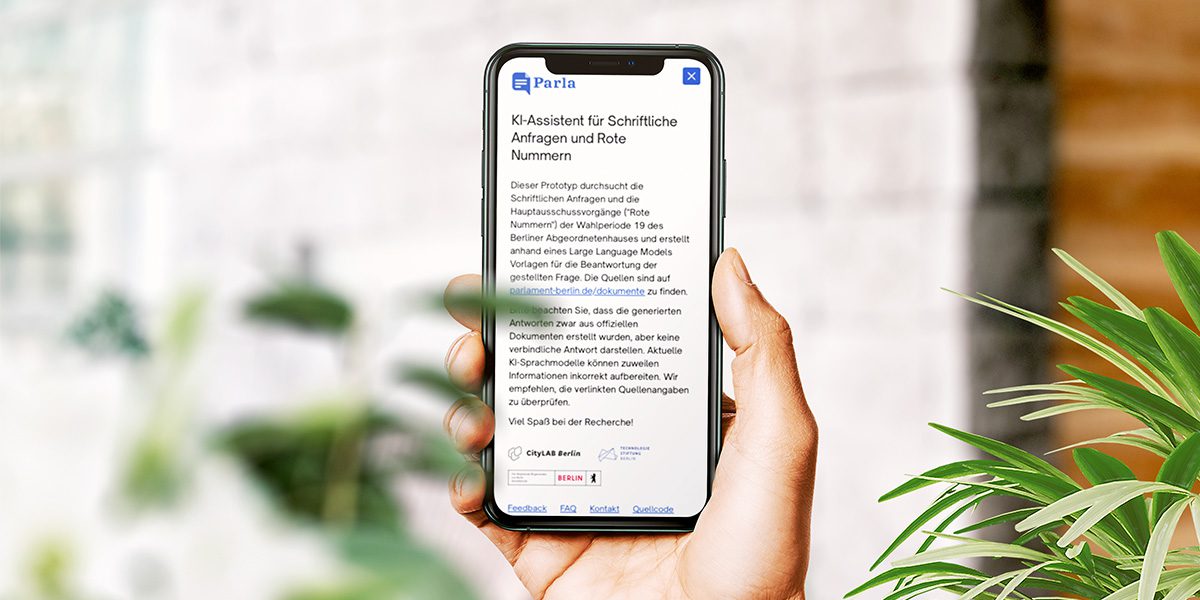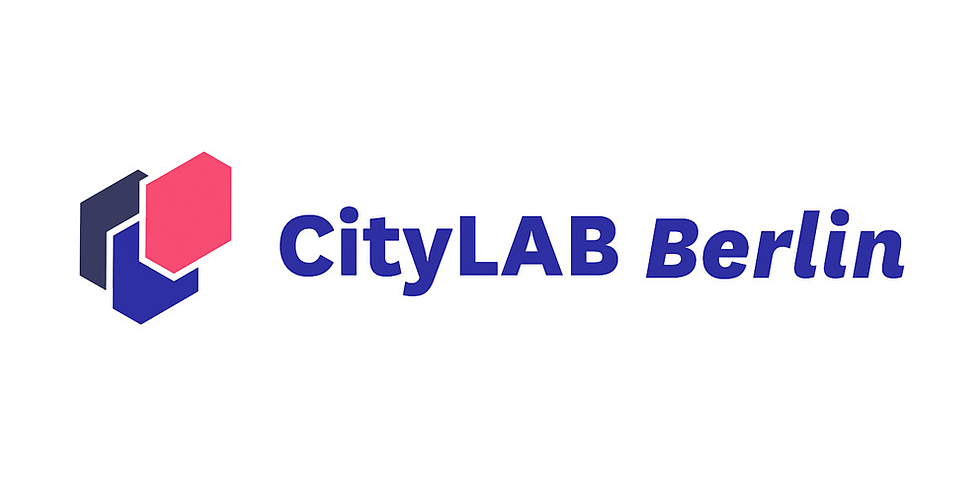Artificial Intelligence assistants can help the Berlin Senate Chancellery manage and analyse public administration’s documentation in a more efficient way

Source: CityLAB Berlin
The Responsible Organisations
The Berlin Senate Chancellery is the administrative staff of the Governing Mayor of Berlin, who is also the minister-president of the State of Berlin. It has participated to the project by funding the development of the tool.

CityLAB Berlin is a public innovation laboratory run by the Technologiestiftung Berlin, a non-profit foundation whose mission is to promote science, research, and education in innovative natural science and engineering technologies, and funded by the Senate Chancellery of Berlin. CityLAB designed and developed the Parla tool.

This article is based on insights gathered from an interview with Karen Laßmann, leader of the Smart City and Data Management Team within the Department for Digitalisation of the Senate Chancellery of Berlin and Benjamin Seibel, director at CityLAB Berlin and Parla’s project manager.
1. The problem
To effectively carry out all their duties, civil servants often consult a substantial amount of information stored in public administration documents. Finding specific material from such a vast documents collection can be both difficult and time-consuming, especially if the consulted documentation is stored in decentralised digital databases, which requires to manually search in different virtual spaces for the documents. This problem can also be encountered by citizens, civil society or private sector actors looking for publicly available documentation to access specific or general information regarding governmental affairs.
Generative artificial intelligence (GenAI hereinafter) can help analysing and learning from large repositories of information, offering promising potential to centralise, manage and access data more efficiently. These benefits of GenAI have been explored in Berlin to help public administrators and civil society quickly find specific files and policy documentation on publicly relevant matters.
2. The solution and its development: Parla AI Assitant
The Berlin Senate Chancellery and City LAB Berlin developed “Parla”, an AI assistant that generates response suggestions by extracting information from more than 11,000 files published on PARDOK, the parliamentary documentation website.
The general objective of the project was to streamline the research of Berlin public administration’s documentation. As a matter of fact, even though PARDOK made it possible to digitise documents dating back up to 1989, searching for relevant files was still long and complex. In addition to optimising access to general publicly available documentation, Parla aimed at ensuring also open and simplified access to all the answers that the State of Berlin has provided to the written requests by parliamentarians for civil servants and citizens in the current legislative term.
2.1 Description of the AI tool
Parla is described by its creators as a GenAI system that employs retrieval augmented generation (RAG) techniques to make indexed public administration documents searchable:
“With our new prototype, we are using artificial intelligence to search through large, unstructured volumes of text in a matter of seconds, linking and summarising them in a meaningful way, so that the tedious manual search for a specific piece of information mentioned in one of the numerous meeting minutes can be eliminated in the House future”.
The technology employed is a large language model (LLM), notably GPT-3.5-turbo, a commercial LLM developed by OpenAI. Nevertheless, Parla is described as “model agnostic”, meaning that the underlying model can be replaced at any time with other LLMs. Due to limitations of the current model identified in the accuracy of the model in managing recent or numeric data, the development team implemented additional Retrieval Augmented Generation (RAG) techniques, which extend the model capabilities by incorporating external data sources and, specifically in this case, the documentation stored in PARDORK.
Whenever an end user asks specific questions on public measures to Parla, the tool analyses the information from the written parliamentary requests and committee minutes of the current electoral period. The documents selected and analysed are referenced in the written response, so users can verify the information provided.
2.2. Development process and implementation
As declared by Karen Laßmann, Parla’s responsible at the department for Digitalisation of the Senate Chancellery of Berlin,
“as primarily an innovation hub, CityLAB Berlin is free to produce innovative tools and services independently. At the same time, since it is also deputed to support Berlin public administration in its digitalisation, the Berlin Senate Chancellery can request the CityLAB to develop specific products based on their necessities”.
In the case of Parla, the idea originated during a workshop on emerging technologies organised by the CityLAB, when a group of civil servants working with PARDOK every day highlighted the added value that a GenAI tool using that information would provide. Based on this input, the in-house development team started the prototyping of the tool.
First, all PARDOK documents were imported and converted into machine-readable data by separating all the PDFs in single pages, extracting its content and creating machine-readable summaries of each document. Afterwards, three different search algorithms were implemented to match user questions with the relevant data in the documents. These three algorithms serve to provide the LLM with a specific selection of relevant material for the query (commonly known as “context”).
Parla’s development was conducted in-house from an agile approach to ensure the tool release in only a few weeks. As stated by Dr. Benjamin Seibel, director of the CityLAB Berlin,
“the success of an innovative project is also a consequence of how rapidly it is published, as it happened with Parla”.
Parla’s design was, also, user-centric, as it was developed as a direct response to civil servants’ request, and it was informed by testing and feedback gathering. As a matter of fact, according to the feedback received, the large majority of the users are public administrators and politicians. However, citizens, journalists and everyone with interest on publicly related matters can also use the tool and have used it with a smaller rate.
2.3. Next steps and reusability
Due to the agile prototyping approach, Parla cannot be considered as a ready-made, finished solution, but rather a tool under continuous improvement. Newly identified technical challenges and regular user feedback provide information to guide its update and improvement. Among the proposed next steps, public servants observed that it would be helpful to supplement Parla with other documents, including internal administrative files. To permit this in a secure manner and retaining data sovereignty, the state of Berlin might need to host its own LLM.
As a non-profit public foundation, CityLAB Berlin must keep all its developments transparent and publicly available. In fact, Parla is an open-source solution and can be reused both within the public administration in Berlin or by other municipalities and States in Germany. Some municipalities, like Hamburg and Munich, are developing AI assistants with similar functions using private code solutions, while other cities in Germany are planning to re-use Parla’s open-source code, together with its development guidelines, to produce their own AI tool trained with their archives’ documentation.
3. Expected Benefits
Parla offers a range of benefits, especially:
-
Increase efficiency due to time savings. The tool turns decentralised and manually searchable documents into a single source of information that can be analysed organically thanks to GenAI. This helps users – mainly civil servants and decisionmakers – to find the right sources for their daily tasks in faster and potentially improve the decision-making process.
-
Enhance information transparency for civil society. As citizens can easily access all the relevant data on public matters in the State of Berlin from a single website and mobile app, the tool helps them stay informed and involved in the local democratic processes.
-
Promote wider innovation thanks to reusability. As an open-source solution with its code and development guidelines available on GitHub, other municipalities and public entities can reuse Parla and create similar tools. At the same time, as stated by Benjamin Seibel, the possibility for others to scrutinise Parla helps to improve the tool itself.
4. Main challenges
As it was highlighted by the project members, some challenges have been identified to be addressed in the short and medium term:
-
Hallucinations of the AI model. The current state of the technology does not eliminate completely the likelihood for the LLM to provide incorrect or confabulated answers, particularly with numeric outputs. While the development team keeps working on this, current mitigation measures comprise the inclusion of references to its source documents to enable users’ control and verification, together with a disclaimer on the fallibility of the tool and a form to report any technical issues.
-
Lack of skills related to GenAI prompting. Since the use of GenAI at a large scale is quite a new phenomenon, it should be not taken for granted that everyone knows how to do it effectively. As the quality of a response depends also on the accuracy of the users’ prompt, the project team is planning workshops and tutorials on how to use Parla and make the most out of it.
Website and Contact Information
Useful links:
-
Parla’s website: https://www.parla.berlin/
-
A description of the tool and the project made by Dr. Seibel: https://citylab-berlin.org/en/blog/parla-intelligent-knowledge-management-for-administrative-documents/
-
The source code of the tool in GitHub: https://github.com/technologiestiftung/parla-frontend?tab=readme-ov-file
-
A technical explanation on the technical structure of the tool: https://citylab-berlin.org/de/blog/parla-technische-entwicklung-des-neuen-ki-tools/#Datengrundlage
Project contact:
-
Karen Laßmann, Leader of the Smart City and Data Management Team within the Department for Digitalisation of the Senate Chancellery of Berlin, karen.lassmann@senatskanzlei.berlin.de.
-
Dr. Benjamin Seibel, Director at CityLAB Berlin, benjamin.seibel@ts.berlin.
Detailed Information
Case Viewer ID: PSTW-2252
Year: 2024
Status: Implemented
Responsible Organisation: City of Berlin - Berlin Senate Chancellery
Geographical extent: Local
Country: Germany
Function of government: General Public Services
Technology: Generative AI
Interaction: G2C, G2G

